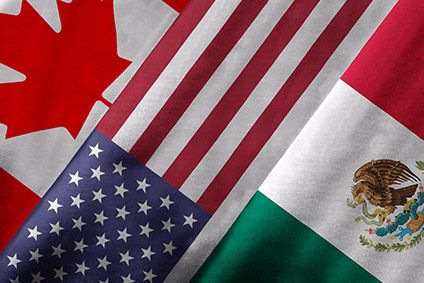
The US Mexico Canada Agreement (USMCA) replacing the 25-year old NAFTA free trade pact has officially been signed off following almost two years of deliberations – but some industry bodies have warned terminating the original before the new version comes into play will wreak havoc.
The signing took place on the sidelines of the G20 summit on Friday (30 November).

Discover B2B Marketing That Performs
Combine business intelligence and editorial excellence to reach engaged professionals across 36 leading media platforms.
The National Association of Manufacturers called it a “landmark milestone” for American manufacturing workers. “This moves us one step closer to restoring certainty to the North American market, the biggest market for US exports in the world. By securing the relationship with our North American allies, we are also better positioned to demonstrate a strong and united front against China’s unfair trade practices and end the harm they inflict on manufacturers in America.”
There are, however, concerns regarding the length of time it could take to actually implement the agreement.
To start with, the International Trade Commission has up to 105 days after the agreement’s signing to submit a report on its likely economic impact.
In addition, the final agreement text must be submitted at least 30 days before implementing legislation is introduced in Congress, and both the House and Senate are statutorily allowed specific periods of time to consider and vote on that bill. Come January, the Democrats will have a majority in the House of Representatives. According to trade law firm Sandler Travis and Rosenberg: “Key Democrats say they will oppose the agreement unless its labour, environment, and enforcement provisions are strengthened.”

US Tariffs are shifting - will you react or anticipate?
Don’t let policy changes catch you off guard. Stay proactive with real-time data and expert analysis.
By GlobalDataThe current Trade Promotion Authority law guarantees a Congressional vote on a USMCA implementing bill regardless of any lawmaker objections. However, if those concerns are not sufficiently addressed the House could vote the bill down or revoke its TPA protections, which in either case could effectively kill the agreement.
Representatives from the US apparel and retail industries have warned against premature termination of the original NAFTA agreement.
“This new pact takes many important steps toward giving us a modern trade agreement with our two neighbouring countries and continues the trilateral framework that protects North American supply chains, supports millions of US jobs and helps retailers provide American families with the products they need at prices they can afford,” says National Retail Federation president Matthew Shay.
However, he adds: “While there may be disagreements over details, it is critical that Congress approves this agreement in 2019 and that NAFTA remains in place until that can be done. The administration should continue to work to quickly resolve the outstanding issues. Withdrawal without a replacement is simply not an option.”
Rick Helfenbein, president and CEO of the American Apparel and Footwear Association (AAFA) says early termination of NAFTA before the ratification and implementation of USMCA would “definitely create economic havoc and uncertainty for American companies who conduct business in the region.”
“Following the successful trilateral signing of the USMCA agreement, this action undermines the trust that has been established since the conclusion of negotiations. We have continuously told the administration throughout the USMCA process that it is essential for the new agreement to be implemented seamlessly so that our businesses can learn the new rules and have time to adjust our supply chains to take advantage of the deal. Adding additional pressure on Congress to sign or fail is not in the best interest of America.”





